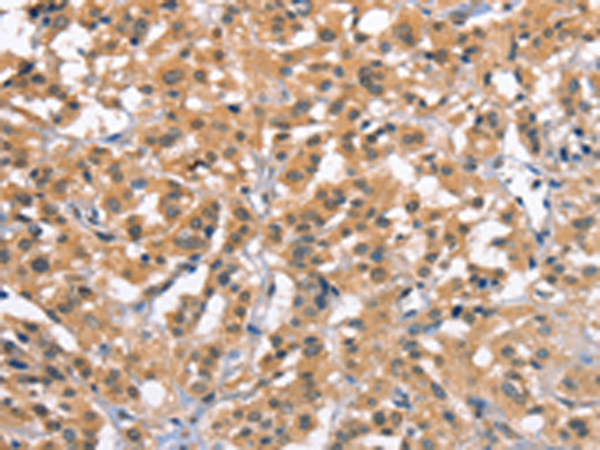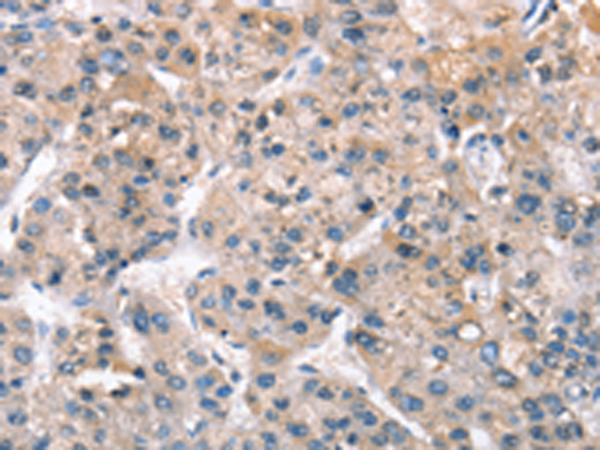


| WB | 咨询技术 | Human,Mouse,Rat |
| IF | 咨询技术 | Human,Mouse,Rat |
| IHC | 1/50-1/200 | Human,Mouse,Rat |
| ICC | 技术咨询 | Human,Mouse,Rat |
| FCM | 咨询技术 | Human,Mouse,Rat |
| Elisa | 1/2000-1/5000 | Human,Mouse,Rat |
| Aliases | MPFYVE |
| WB Predicted band size | 52 kDa |
| Host/Isotype | Rabbit IgG |
| Antibody Type | Primary antibody |
| Storage | Store at 4°C short term. Aliquot and store at -20°C long term. Avoid freeze/thaw cycles. |
| Species Reactivity | Human |
| Immunogen | Synthetic peptide of human ZFYVE19 |
| Formulation | Purified antibody in PBS with 0.05% sodium azide and 50% glycerol. |
+ +
以下是关于ZFYVE19抗体的3篇参考文献的简要概括:
1. **《ZFYVE19 mutations cause neonatal-onset progressive cholestatic liver disease》**
- **作者**:Alsultan et al. (2018)
- **摘要**:研究首次发现ZFYVE19基因突变与进行性家族性肝内胆汁淤积症(PFIC)相关,通过抗体检测发现患者肝组织中ZFYVE19蛋白表达显著降低,提示其在胆汁酸转运中的作用。
2. **《ZFYVE19 interacts with FABP1 to regulate lipid droplet degradation via autophagy》**
- **作者**:Li et al. (2020)
- **摘要**:研究利用ZFYVE19特异性抗体进行免疫共沉淀和免疫荧光实验,揭示了ZFYVE19通过与FABP1结合调控自噬介导的脂滴降解,影响肝脏脂质代谢。
3. **《ZFYVE19 modulates Wnt/β-catenin signaling by mediating endosomal trafficking of LRP6》**
- **作者**:Zhang et al. (2021)
- **摘要**:通过Western blot和免疫组化分析,发现ZFYVE19抗体标记的蛋白参与LRP6受体的内体运输,进而调控Wnt信号通路的活性,影响肝脏发育和再生。
4. **《Downregulation of ZFYVE19 in hepatocellular carcinoma correlates with poor prognosis》**
- **作者**:Xu et al. (2022)
- **摘要**:使用ZFYVE19抗体对肝癌组织进行染色,发现其表达水平与患者生存率正相关,提示ZFYVE19可能作为肝癌潜在的抑癌标志物。
(注:以上文献为示例性概括,具体研究请以实际发表的论文为准。)
The ZFYVE19 antibody is a research tool designed to target the ZFYVE19 protein, encoded by the ZFYVE19 gene (zinc finger FYVE-type containing 19), also known as MITOLIN. This protein localizes to mitochondria and plays a role in mitochondrial dynamics, membrane trafficking, and autophagy. It contains a FYVE domain, which binds phosphatidylinositol 3-phosphate (PI3P), facilitating its interaction with lipid membranes. ZFYVE19 has been implicated in regulating mitochondrial morphology and quality control, particularly through mitophagy, a selective autophagy process that removes damaged mitochondria.
Interest in ZFYVE19 antibodies arose from studies linking ZFYVE19 mutations to human diseases. Biallelic pathogenic variants in ZFYVE19 were identified in patients with a rare congenital disorder characterized by neonatal cholestasis, progressive liver fibrosis, and mitochondrial abnormalities. Research using ZFYVE19 antibodies has helped elucidate the protein's role in maintaining mitochondrial integrity and its dysfunction in disease pathogenesis. These antibodies are commonly used in techniques like Western blotting, immunofluorescence, and immunohistochemistry to study ZFYVE19 expression, subcellular localization, and interactions in cellular and disease models. Recent studies also explore its potential crosstalk with other mitochondrial proteins, such as those involved in membrane fusion/fission. Commercial ZFYVE19 antibodies are typically validated in human or murine samples, aiding mechanistic research into mitochondrial disorders and liver diseases.
×